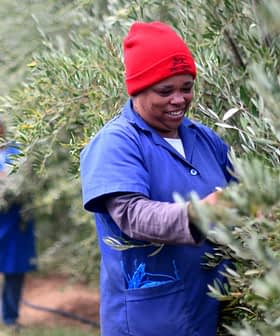
A new chapter in the South African olive oil saga is taking shape with several major developments promising significant reform for the local industry.
According to SA Olive Chairman, Nick Wilkinson, “our biggest problem is imported adulterated olive oil which is fraudulently labelled as extra virgin.” Not only does this oil cost less to produce, but in some cases producers are paid a subsidy which amounts to as much as it costs a South African farmer to produce one litre of oil.
According to the latest figures from SA Olive, only 32 percent of the 7, 5 million litres consumed in 2012 was produced locally. In the absence of working regulations to expose adulterated oil passed off as “extra virgin” and without a level playing field against imports subsidized in their country of origin, smaller producers are finding it increasingly difficult to compete on supermarket shelves. “By stocking our shelves with subsidized and, in some cases, fraudulently labelled products, we are supporting foreign companies at the expense of our local producers and economy,” Wilkinson said.
In an attempt to shield the country’s approximate 75 producers against the backdrop of cheap imports, the industry has applied to the International Trade Administration Commission (ITAC) for a Countervailing Duty to be introduced. Nick Wilkinson told Olive Oil Times the request, which was submitted last year, is now in its final stages. The duty, which is calculated according to the minimum subsidy paid to farmers in the EU, is intended to place local producers on an even platform, with importers and allow the local industry to tap into growing demand. As the Southern Hemisphere prepares for this year’s harvest, a swift decision on the matter may offer some encouragement for local farmers who are faced with the prospects of higher labor costs following two months of strikes, culminating in a wage increase of 52 percent per day (the current rate is €8.90).
Products fraudulently labelled as extra virgin may soon find themselves in contention under the recently enacted Consumer Protection Act (CPA). “The industry is optimistic that such products will be removed from supermarket shelves with buy-in from local retail chains to favor competitively priced locally produced products,” according to Wilkinson. The act is expected to introduce greater transparency when it comes to the misleading claims often associated with the different classifications of olive oil and in doing so protect consumers across the board from exploitation of any kind in the supply chain.
One area receiving particular attention is the restaurant trade where olive oil presented to consumers is often substituted with inferior products. Ultimately, the true benefits for the local industry will depend on effective enforcement and commitment from retailers, some of whom may value profits over a responsibility to offer quality products to consumers.
The issue received some much needed media attention in September last year with the arrival of Tom Mueller who travelled to South Africa to promote his new book, Extra Virginity. In addition to meeting with several local producers and growers in the Cape, Mueller was the key speaker at a Conference hosted by SA Olive. Along with Paul Muller, chair of the Extra Virgin Alliance (EVA), the event was aimed at addressing the quality issues faced by the local industry. Mueller — an avid supporter of quality restoration — commended the work being done by SA Olive and supported the country’s move to acquire membership to the EVA as a means of differentiating itself from the different quality categories of olive oil competing on world supermarket shelves. According to SA Olive’s Wilkinson, the alignment with the EVA is currently in its final stages. The move is considered an important one for South Africa which primarily produces high quality extra virgin olive oil.
In a bid to refine testing parameters and ensure that the quality of South African products are on par with the highest international specifications, SA Olive in conjunction with the Department of Trade and Industry (DTI) and the South African Bureau of Standards (SABS) have embarked on a process to adopt the Australian Olive Oil Standard. This New World convergence, which implies more stringent quality testing than is currently endorsed by the International Olive Council (IOC), is considered better suited to address the unique challenges faced by the local industry.
Olive oil consumption in South Africa has increased by an average of 20 percent per year during the last eight years. If farmers could expect to earn a fair price for their extra virgin olive oil, tapping into growing local demand has the potential to stimulate more than 50,000 new jobs for the economy, according to SA Olive.
While the industry waits for the outcome on various decisions, producers are turning to innovative and practical means of packaging their products to distract the consumer’s attention from the plethora of imports on supermarket shelves. Consumer education will also prove pivotal in reducing the dependency on imports and ensuring that the local market continues on this impressive growth path.
At the helm of this cause to inform the consumer about the benefits of using the “real deal,” SA Olive will place the emphasis on their certified “Commitment to Compliance” label which assures the consumer that the contents are 100 percent extra virgin olive oil which has been chemically and organoleptically tested, with no defects.
References:
SA Olive website
Olive oil industry waits for import duty, Farmer’s Weekly, 8 March 2013
Emerging farmers hardest hit by wage strikes, Farmer’s Weekly, 21 January 2013
Virgin Territory, Sunday Food, 14 October 2012
Call for olive oil’s anti-subsidy duty, Financial Mail, 3 September 2012




